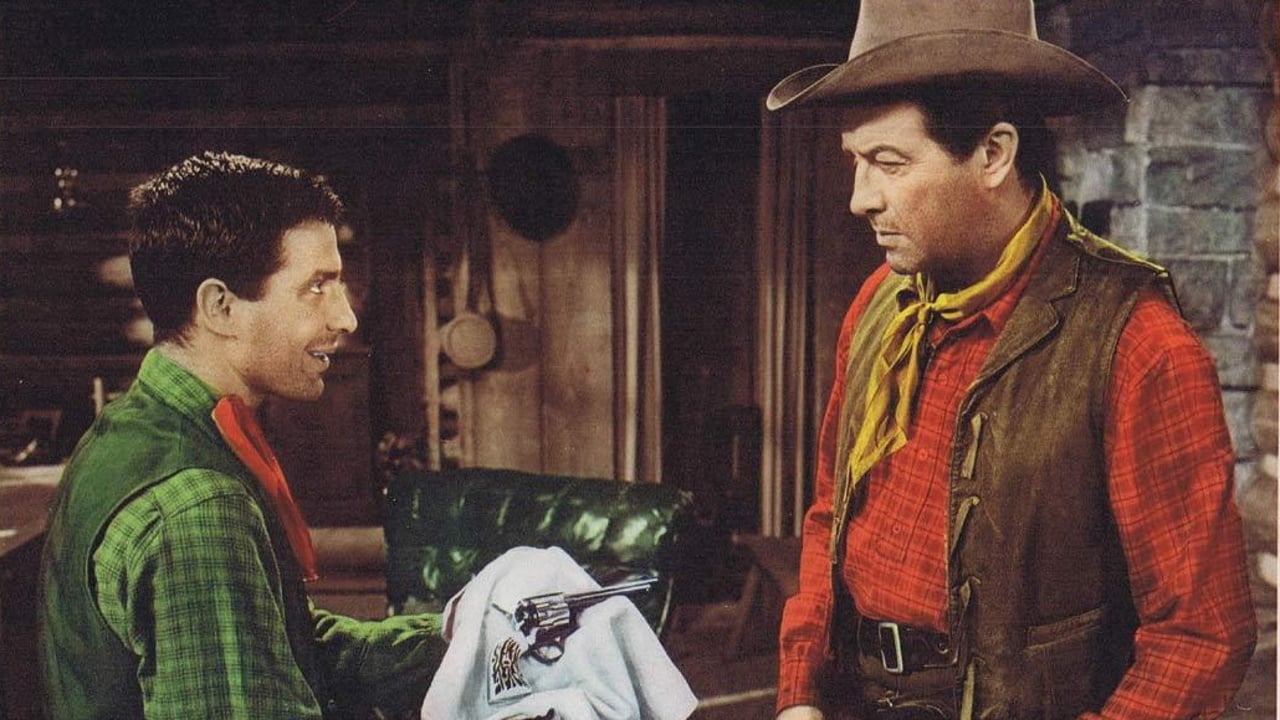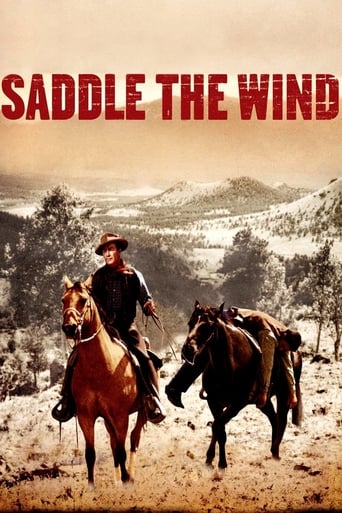

This is the classic Western as it is just one of the millions of different stories of the old West but similar to all of them. You get a glimpse of the lifestyles, the risks and the rewards and yes the law was settled by gun-play until it was not. This Western has it all. Gunfights, horses, cattle, bar, whiskey, a love interest with a backstory and of course heroes and villain. Great emotional scenes that just push and pull on you too making it a must see for the viewer so you can be entertained. All the actors are at the top of their game too. Scenery is beautiful and one can easily imagine how pleasant it was to live this simple and rewarding life as the seasons changed. Nice song in the opening credits and later on too. Listen to the words for they are well chosen. Nice ending with good closure. Recommend a dinner meal with tasty drink followed by a good snack for the maximum viewing enjoyment. Saddle up, mount up, ride and then call it a night...
... View MoreHighly watchable Western based on a story by Thomas Thompson with screenplay by the prestigious Rod Serling ; dealing with confrontation between family members and about fights between cattlemen and homesteaders . The picture gets action Western , shootouts , wonderful outdoors and turns out to be quite entertaining with amazing visual style . This interesting movie is set in post-Civil War ; it features Steve Sinclair (Robert Taylor) , a world a world-weary , prior gunfighter , now living as a peaceful farmer , his wild younger brother Tony (John Cassavetes) , and a previous dance hall girl , Joan Blake , (Julie London) , masquerading as a lady . Tony meets the cabaret girl Joan and impulsively to marry her , returning to run the family ranch . Then , things go awry when Tony arrives on the scene with his new bride Joan Blake . Everyone there is enchanted with Joan ; however , when some settlers (Royal Dano) appear , events go wrong . Agreeable Western packs drama about sibling squabbles , thrills , shootouts , go riding and some moving action sequences . It's a medium budget film with good actors , technicians , production values and pleasing results . In this case family feuds make for a really thrilling film , as it contains a thoughtful and thought-provoking script regarding to the ranch scenarios , adding ranchers confrontations , joining Western with melodrama . As well as making full of sense , intense drama and intelligence . ¨Saddle the wind¨ was hardly received its fair due and panned by some critics , as Western genre being past their peak of popularity . And the final is poignantly as well as dynamically unexpected , including an exciting duel . Good performances from Robert Taylor as obstinate ex-gunslinger , this is the best movie of Taylor's later work ; John Cassavetes as reckless as well as nutty young brother who gives a mannered but intelligent acting and Julie London as his bride who bears a dark past . Julie London catches the eye carrying out an imaginative and gorgeous acting ; besides , playing an attractive song . Large plethora of secondaries , such as Charles McGraw , Royal Dano , Richard Erdman , Ray Teal and special mention for Donald Crisp as old patriarch baron land . Colorful and glimmer cinematography by George J. Folsey , being magnificently illuminated in Cinemascope and Metrocolor , setting itself against the marvelous backdrop of the Colorado Rockies , actually filmed on location in Rosita , Colorado . Evocative as well as atmospheric musical score by the great Elmer Bernstein , along with a catching song at the beginning composed by Jay Livingstone . However , a first soundtrack was written and recorded by Jeff Alexander but had to be replaced due to extensive re-cutting . The motion picture was professionally directed in sure visual eye by Robert Parrish providing an abundance of noisy acting , color and stirring happenings . Among his best received works was this brooding western ¨Saddle the Wind¨ (1958) . He was an Academy Award-winning film editor who also realized and acted in movies . Parrish was soon working on some of Hollywood's most prestigious films, cementing his reputation as one of the America's premier editors . Unfortunately, while many of his directorial efforts were visually impressive ,especially his war drama , ¨The Purple Plain¨ , his labour as editor was excellent . As an editor he won an Academy Award for Body and soul (1947), the 1947 Robert Rossen film that starred John Garfield as a money-grubbing, two-timing boxer on the make . Parrish also worked on All the King's Men (1949), an account of the rise and fall of a Louisiana politician that won the Academy Award for Best Picture . Parrish then moved on to direct films during the 1950s and 1960s . He realized a variety films of all kind of genres , such as melodrama : ¨Fire down below¨ , comedy : ¨The Bobo¨ , parody : ¨Casino Royale¨ , a Noir film titled ¨Cry danger¨ , a Sci-Fi picture titled ¨Journey to the far side of the sun¨ , a thriller titled ¨The Marseille Contract¨ or ¨The Destructors¨ and another strange Western called ¨A town called Bastard¨. And of course , ¨Saddle the wind¨¨ resulted to be one of his best films .
... View MoreI am of the belief that "Saddle The Wind" (1958)can be pretty much summed up when Robert Taylor (Steve Sinclair) takes a gun away from his brother John Cassavates (Tony Sinclair)after he kills a man and says, "The use of it ... you got from me .... but where did you get the love it?" How many times have we seen the older reformed gunfighter take away a gun from his gun crazy kid brother who just happens to be full of hubris? We have seen this pedestrian western plot time and time again. Sometimes it is reworked, and the kid brother full of hubris may be changed to a son full of hubris or a friend full of hubris but regardless of whether they be kid brother, son, friend or any other concocted character, it is the "hubris" that leads to their untimely demise which is usually delivered by the reluctant reformed gunfighter. Examples of these re-occurring reformed gunfighters and kid brother type of characters show up in films such as "Vengeance Valley" (1951)starring Burt Lancaster (Own Daybright/fast gun) Robert Wagner (Lee Strobie/friend with hubris), "Man Without A Star" (1955) starring Kirk Douglas (Dempsey Rae/fast gun)and William Campbell (Jeff Jimson/friend with hubris), "Gunman's Walk" (1958)starring Van Heflin (Lee Hackett/fast gun father)and Tab Hunter (Ed Hackett/son full of hubris). What I find most astonishing about these usually entertaining pedestrian western with similar plots is they always seen to work and entertain time and time again. Rod Serling wrote this one and the dialog is everything a western movie fan could ask for!
... View MoreSaddle the Wind tells the story of Tony Sinclair (John Cassavetes), the troubled younger brother of Steve Sinclair (Robert Taylor) who both share ownership of a cattle ranch. They make for an interesting pair, the caricatured, out of control and insecure kid vs his mature, older, wiser, and better with a gun brother. What's more interesting, but isn't really developed very well, is the emerging situation between Taylor and Julie London, who plays Cassavetes somewhat reluctant fiancée that he brings home after a night of carousing. Charles McGraw has an interesting if abbreviated role as the well known gunfighter Larry Venables, who comes into town hunting for Steve (Taylor) but has to deal with Tony (Cassavetes). Purely by luck, Tony kills the far better Venables and now really believes he's a gunfighter. Not only did he kill one of the fastest gunmen around, but he defended his brother as well. He's a kid playing a man's game, and his actions get more out of control, leading to an inevitable showdown with his brother. Putting a juvenile delinquent in a Technicolor western wasn't unknown in the fifties, but Cassavetes is definitely more at home in Brooklyn than Wyoming.
... View More